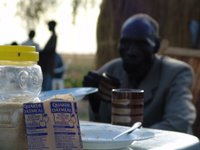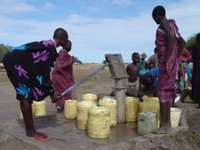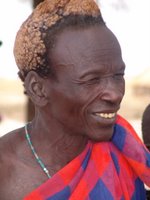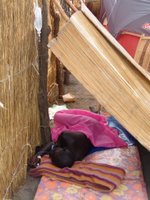I'll attempt to give you a picture of our time in Southern Sudan by sketching the basics in brief first.
Food
Steven, our Sudanese director, had purchased our food supplies in Kenya
 during a previous visit, so we were blessed to have rice and beans from Kenya. From time to time, we were also served green grams (smaller beans) and ugali. The first few days, we even had Quaker Instant Oatmeal for breakfast,
during a previous visit, so we were blessed to have rice and beans from Kenya. From time to time, we were also served green grams (smaller beans) and ugali. The first few days, we even had Quaker Instant Oatmeal for breakfast,  but since that was such a novelty to everyone, we ran out of this soon and ended up eating either rice and beans again, or simply the snacks we had packed (roasted barley, trail mix etc.)
but since that was such a novelty to everyone, we ran out of this soon and ended up eating either rice and beans again, or simply the snacks we had packed (roasted barley, trail mix etc.)Water and Drinks
Water is a scarce item in Sudan. Steven brought water from Kenya, and boy! did we ever drink water! Even the Kenyans on our team who rarely drink water were chugging at least at two liters a day. And even so, we rarely had to use the bathroom since we perspired so much. There are some entrepreneurs in Sudan who purchase Coca Cola in Kenya and sell it at more than three times the price you pay down south. However, as we were visiting with one supplier, he explained that he has to pay "taxes" at several road blocks--bribes to the police of both Kenya and Sudan.
Nevertheless, it meant that we had hot Coke once, and when I was in Padak for business one day, I was able to take cold sodas to the team. The rest of the time, we drank hot tea.
Regarding water: There is one well in the village of Kolmarek, and there's a constant line of ladies waiting to pump water.
 The only time (including at night) I didn't see a line at the well was when there was a terrible rain storm. But the moment the rain became lighter, women ran back to the well to get their supply of water...
The only time (including at night) I didn't see a line at the well was when there was a terrible rain storm. But the moment the rain became lighter, women ran back to the well to get their supply of water...Water containers are very valuable to the Sudanese. When I gave my Nalgene bottle to a Sudanese friend before leaving, her eyes welled up with tears. "Thank you, thank you, thank you! But what will you use?" I assured her that I'll be OK, and was thinking of how we take the smallest things for granted...
If you consider the scarcity of water, it is understandable that taking showers is not a priority to most Sudanese. When we walked by the well one late night, a young man was standing nearby in just his under pants, washing. In fact, teaching the people of Southern Sudan to at least wash their faces is a major goal not only for ELI, but many other NGOs as this will reduce the prevalence of blindness caused by trachoma (a disease carried by flies, causing the eyelids to turn inwards and the eye lashes to scratch the cornea, causing what looks like cataracts.)

As for our team, however, Steven and his staff built a shower prior to our arrival. There's a big water container outside the shelter, and depending on a number of circumstances (did the ladies have time to fetch water? did too many others take a shower before you?) we'd have some water to scoop into a small bucket and then wash up.
What I loved most about this shower was the fact that you had a clear view of the stars as you're "showering." You'd stand there listening to the crickets, frogs (when it had rained), the birds, and at night, you could always hear the drums far off as the people in the cattle camps were wrapping up their work for the night and relaxing to singing and dancing.
What's a cattle camp?
When the previous ELI team came back from Sudan, they talked about visiting a cattle camp, where kids live among cows. I didn't "get it" until Sunday night, when we went on a 40-minute hike to the nearest cattle camp.
Now you have to understand that Southern Sudan is FLAT. Except for in the far south west (in Western Equatoria, the province that borders onto Uganda), Southern Sudan has no mountains--not even hills. Nor do they have rocks. It's just flat. You can literally see for hundreds of kilometers!
 As we were heading straight west, you could see a line of cows approaching from a northern direction. As far as the eye could see, there were cows: at least 10,000 of them!
As we were heading straight west, you could see a line of cows approaching from a northern direction. As far as the eye could see, there were cows: at least 10,000 of them! The Sudanese like this one type of cow--I'm not sure what it's called. They have big horns. Some might have a few spots. Some are shades of gray (which they call blue bulls), but for the most part, the cows are white.
Imagine the sound as we crossed paths with the herd...

It was fascinating watching the cattle each head to their own spot. Through a Dinka translator, a young man explained to me that the cows know where to go. Since 10,000 cows tend to wipe out the grass in an area after a while, the camps move from time to time. First thing the herdsmen do is to put down about 6 stakes in a circle, with a rope tied to each stake. The cattle are then tied to these stakes.
It's the job of young Dinka men (teenage boys) to tie the cattle down. Younger kids are in charge of their own circles of calves, with even kids as young as 3 have the young calves to tend to.
 One by one, the cattle are then untied again and taken to a spot close to the pile of cow ash. Collecting dung in the mornings and putting it on the fire to burn into a white ash is the job of young kids, too. The ash is used for several reasons:
One by one, the cattle are then untied again and taken to a spot close to the pile of cow ash. Collecting dung in the mornings and putting it on the fire to burn into a white ash is the job of young kids, too. The ash is used for several reasons:* the teenage boys take handfuls and cover the cattle from head to toe to keep away flies and mosquitoes. This seems to really work, since there were hardly any flies or bugs around the camp!
 * the ash is used for brushing teeth--they dab a wet forefinger into the pile and brush their teeth with their fingers. "It tastes salty, but it's good!" Steven told me. I wasn't going to try!
* the ash is used for brushing teeth--they dab a wet forefinger into the pile and brush their teeth with their fingers. "It tastes salty, but it's good!" Steven told me. I wasn't going to try!* the toddlers sleep in the ash, once again to keep away bugs
* men seem to like using it for decoration. Several had painted "beards" with the ash. One had painted his entire head, stating, "Today is a good day because we have visitors. I do this only on good days..." One man had bleached his hair by rubbing cow ash into it, and then dunking his head under cows when they urinate. For real!
As we walked around the camp, things that struck me were:

* there were no homes, just a handful of shelters. Keep in mind that this particular camp is home to at least 600 people and even has its own chief (like a mayor). There is no protection against the elements. One lady whom I visited with explained that their UNHCR tarp was home to 40 people when it rained. On ordinary evenings, only moms with young babies would sleep under the tarp.

* there were no latrines. Everyone simply walked away from the busy-ness of the camp and did what they had to do somewhere in the field.
* there was no "stuff." Most of the people wore either nothing at all, or they had just one outfit (given to them by the UN), so they needed no closets etc. I did find one "safety deposit box," a mound made of mud where one man had kept a few documents (immunization cards etc)
 * there weren't kitchens, even. Most of the children drink only milk three times a day, seven days a week. But there are a few grandmas who make fires around the camp and cook sorghum (which they get from the UN).
* there weren't kitchens, even. Most of the children drink only milk three times a day, seven days a week. But there are a few grandmas who make fires around the camp and cook sorghum (which they get from the UN).I was able to talk to a number of people about life in the camp, and then we went to sit under nearby trees while people kept bringing their cows so we would take photos of the cows... One man brought his bull and started singing a song, which is very much like Dinka. Afterwards, he did a long monologue, explaining that they had never had visitors at their camp, that they are blessed that we had come to see how they live. With the help of a translator, I explained in return that we have come to remind them that God cares about them, even as they sleep under the stars, to know that God cares.
How does one really share the Gospel?
During my visit to Kolmarek, I often wondered about this thought. I know how to explain the message of salvation to people. But many of the Dinka are Christian--that is, in fact, why the Muslims have been waging a war against them for decades! So what is the purpose of our visit, other than providing desperately-needed medical services? (The nearest hospital is a 5-month journey from this village, in Khartoum! The South has NO hospitals, NO post offices, hardly any schools, no phones, very bad roads...)
In sitting and talking with villagers, we showed them that God still cares, despite the desperate lives they have been living.
One afternoon, rather than returning to the clinic to help dispense drugs, I stayed at the base to talk with some of the women. It was another very hot afternoon with the temperature far in excess of 100 degrees. As I bent down to enter into the small door of the kitchen hut, I found my friend Mary, the sweat running down her face, emptying out the insides of a sheep's intestines. Knowing I had my camera with me, Mary asked if she could put on her shirt before we continued talking. (The ladies think nothing of taking off their shirts, which is understandable in that heat!)
 Mary (with the white shirt) had spent several years in Kaukuma, a refugee camp in Kenya, and speaks excellent English. She is now a first-grade teacher at the school we started in that village.
Mary (with the white shirt) had spent several years in Kaukuma, a refugee camp in Kenya, and speaks excellent English. She is now a first-grade teacher at the school we started in that village.I sat next to the fire and had her show me exactly how to clean the intestines. And we started visiting about life, about marriage (Dinka women have no choice whom they marry; it is decided by their father), about God. And I was reminded once again how differently we view God. Mary explained that she worshiped God "because He's good." I asked questions about the war. Is God still good when all your people have died? "Yes! Even if your people have died, even if your land had been destroyed, God is good!" she said emphatically.
When rains loomed in the east, Steven said, "God is good. It will not rain. It can rain after you have left..." Yet the heavens poured down on us in a storm unlike anything I've seen in Kenya. Afterwards, Steven simply said, "God is good. The rain was good."
We Westerners would look at the Dinka and conclude that they are poor. Many eat sorghum and milk every day of their lives. Their land has no infrastructure. They have no source of income. Yet they don't see themselves as poor. And, somehow, they have hope.
Jeremiah 29:11 isn't just a "nice thought" to them, something they put on bumper stickers and graduation cards. They can identify with the people in exile in Babylon. Verses 10-14 is a reality they've been living, the hope they are holding on to.
Before going to Sudan, I wondered what I really could do or share. I went in order to take photos, to share the story of the Dinka people with others who care, to record teachings for future use.
For someone to come and listen to them meant the world to the Dinka: the fact that we came--sat with them, ate with them, worshiped with them--reminded them that they worship a God who cares.
The medicines we gave will soon be out of their systems. Worms will return. Malaria will show up again. But the hope they have is what will carry them through. Even if there were to be another war. Which I pray will not be the case...
The Miracle of Abiye
So the Dinka believe God is good, despite all they have faced. But do they know that He is the all-powerful God, a God who still can and will do miracles? As I knelt beside 15-year-old Abiye's mat last Thursday, I prayed that she and her people will see that God is more than simply good.
Abiye was brought to our "clinic" (a temporary setup in the mud classrooms of the school) on Thursday morning. She had had seven episodes of diarrhea and vomiting that morning. Prognosis: Probably typhoid or cholera. Rachel (one of the nurses on the team) connected a saline IV.
 As the morning progressed, Abiye's condition worsened to the point that she had no pulse and no blood pressure. Her hands and feet were like blocks of ice. "Her body is shutting down," one nurse commented. "There's nothing more we can do. Let's just make sure she's comfortable..."
As the morning progressed, Abiye's condition worsened to the point that she had no pulse and no blood pressure. Her hands and feet were like blocks of ice. "Her body is shutting down," one nurse commented. "There's nothing more we can do. Let's just make sure she's comfortable..."More than anything, I wanted to go and pray for her. I sat on the mound of dirt next to her body and held her ice cold hand in mine. Wiping her face with wet cotton wool, I prayed and prayed for God to have mercy on her, for her family to see God's power... Others prayed until we finally had to leave, knowing that there really was nothing more we could do.
She came home with us that afternoon so the nurses could continue to give her IV fluids. Yesterday, she went home. She has been healed!
Do we serve a good God? You bet we do! But he's good even when we don't understand war and famine, droughts and floods, good and evil.
A friend sent me a verse today, Job 22:21
"Acquaint now yourself with God [submit to Him] and be at peace; by that you shall prosper and great things shall come to you."
My goal shall remain to acquaint myself with my Savior and to submit to Him. What a privilege to also see Him through the eyes of believers in Sudan...
About Guns
A friend wrote me last night, asking about guns in Sudan. Had we seen people carrying machine guns? We saw several guns. We saw big machine guns mounted on vehicles that were escorting returning refugees to Malakal (further north). That seemed understandable, in a way.
 But men would stop by our compound to come and visit, their AK47s slung over their shoulders. And I walked by several cattle herders (who were taking care of smaller herd they'd actually keep at home, not in a camp) who carried AK47s.
But men would stop by our compound to come and visit, their AK47s slung over their shoulders. And I walked by several cattle herders (who were taking care of smaller herd they'd actually keep at home, not in a camp) who carried AK47s. We were told that the government is going to collect all the rifles someday... I can't imagine why people would give up their rifles, though. They have a constant fear that the Arabs are going to attack again. But not only the Arabs. We had two guards every night carrying AKs. We were told they're protecting us against the Morukai, a tribe living just east of us who still come and abduct children and kill entire families...
I never felt unsafe for a moment, though. I just wished we could educate the gun-wielding citizens to always point the nuzzle to the ground or up in the sky! Many would stand and visit, the gun thrown over their shoulder and the nuzzle pointing straight at a crowd! No Sudanese even seemed to notice...
For more on what ELI is doing in Sudan, visit http://empoweringlives.org/sudan.shtml

I went to the eye doctor and she doing this big fundraiser in her office to bring eye care to a village north west of keyna about 6 hours. She is in need of some place to send her equiptment (and a big box of soccer balls!) so the kenyan government or who ever else doesn't mess with it before it gets to it's destination. This is very expensive equiptment so I was wondering if you knew of a way she can get the equiptment through without losing any of it? She is slated to bring a team of four doctors to setup and train the kenyan's how to use the equiptment make glasses and such. Any advice or suggestions?
ReplyDeleteYour eye doctor has been in contact with me and I've shared some thoughts with her. She is, in fact, coming to our village in Ilula.
ReplyDelete